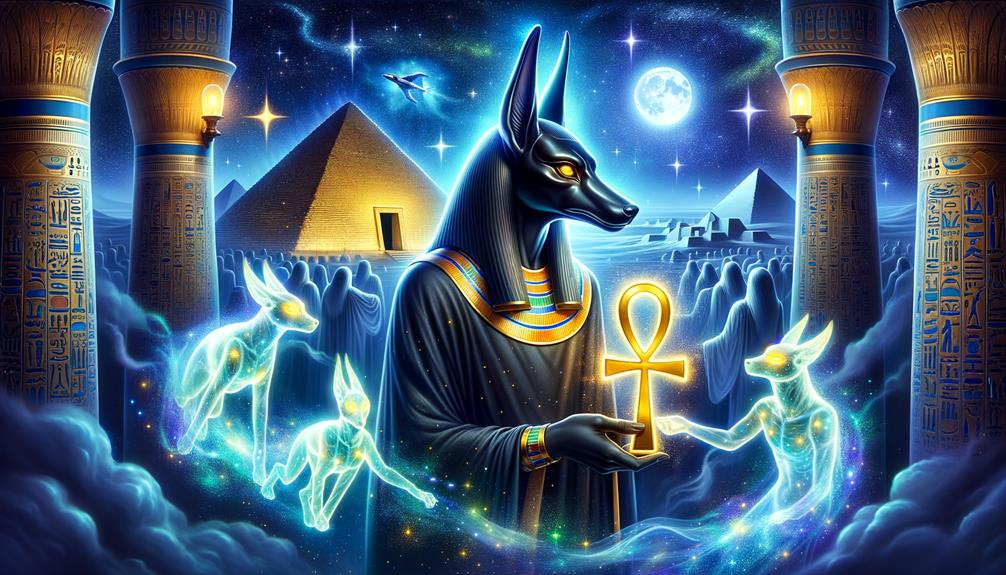There's an old saying: 'Death is a journey, not a destination.' This phrase rings particularly true when you think about the complex mythology of ancient Egypt, and more specifically, the figure of Anubis. Picture a god with the head of a jackal, who watches over mummification and the afterlife. Anubis' role was to act as a guide and protector, leading the spirits of the departed through the maze-like underworld filled with potential dangers and divine judgment.
I find myself captivated by the multiple layers of symbolism and the ritualistic purposes that Anubis signifies. From his ties to death and rebirth to his important place in the ancient Egyptians' views on morality and the afterlife. It leads to an interesting question: how did such a mysterious figure gain such an integral role in one of the most long-lasting civilizations in history? Well, get ready to satisfy your curiosity as we're about to probe into the origins, importance, and lasting influence of this compelling deity.
Understanding Anubis' Role

Let's chat about Anubis, shall we? Anubis plays a central role, guiding lost souls through the Land of the Dead. He's like the ultimate tour guide for departed spirits on their way to the afterlife. This Egyptian god was pretty important in the ancient Egyptian religion, acting as a bridge between life and death. As the god of the dead, his job was to usher the deceased to the Halls of Maati, the divine courtroom, if you will.
There was a rather intriguing ritual, where Anubis was thought to weigh each person's heart. This was a vital step for the soul's trip to the afterlife. This ritual shows just how crucial Anubis was in ensuring life continued past death.
Interestingly, Anubis also had a hand in mummification and the Opening of the Mouth ceremony. These were key parts of the journey to the afterlife. Often shown as a black jackal-headed man, Anubis was viewed as the protector of the mummy and the burial ground.
Anubis in Ancient Egyptian Mythology
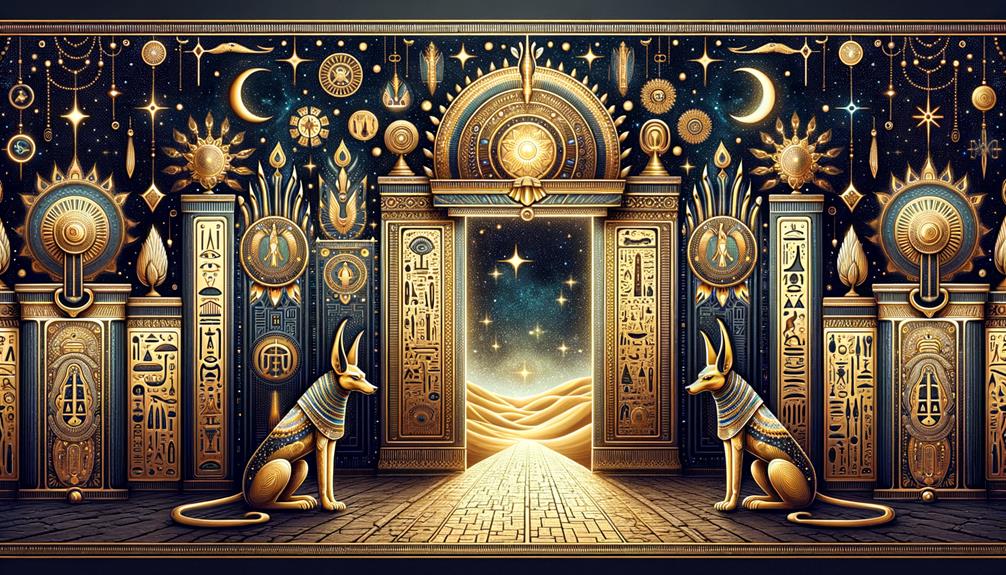
Let's dive deeper into the fascinating role of Anubis in the journey to the afterlife, as portrayed in ancient Egyptian mythology. Known as the jackal god, Anubis gives us a glimpse into the captivating beliefs of the ancients, deeply entwined with the mysteries surrounding death and life beyond. When we journey into the Land of the Dead, Anubis takes us by the hand, guiding us through the fascinating Egyptian mummification process, a critical ritual meant to aid the departed on their journey to the afterlife.
Here are some key reasons why Anubis was held in such high regard:
- He was the god of embalming and played a pivotal role in the mummification process. It was believed that Anubis was the inventor of mummification and he even assisted in the embalming of Osiris.
- With a jackal's head, Anubis, the god of mummification, was seen as a protector and guide, ensuring the spirits of the departed were safe as they journeyed through the afterlife.
- His responsibilities did not stop at guiding and protecting; he was also involved in judgement. In the Halls of Maati, he weighed the hearts and protected the innocent from Ammut, the devourer of souls.
These rituals, including the secrets of mummification and protection of the deceased, showcase the deep significance of Anubis in ancient Egyptian mythology.
Interpretations of Anubis Imagery
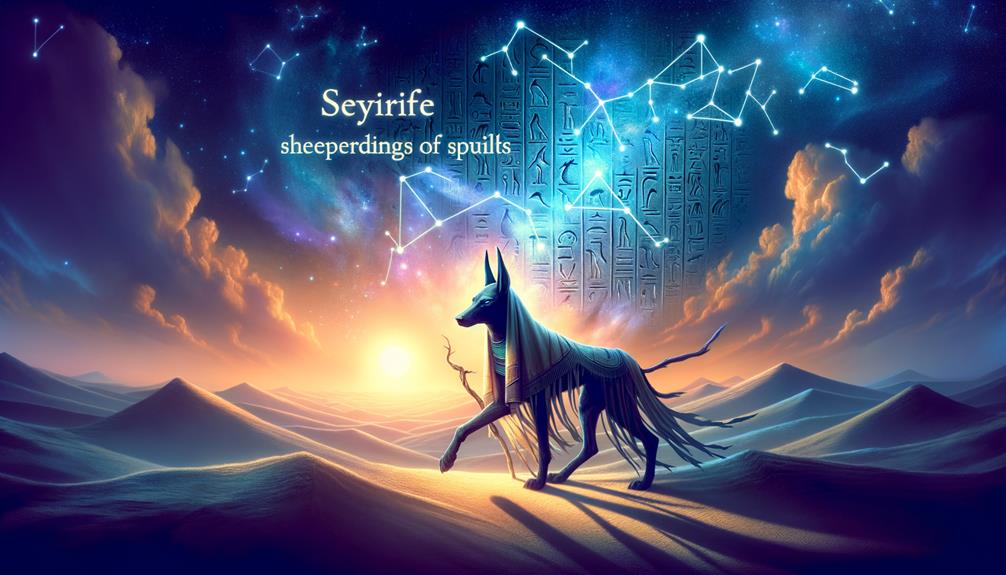
Let's delve into the fascinating imagery linked with Anubis, a highly revered Egyptian deity. To truly appreciate each portrayal of Anubis, it's key to grasp the deep-seated symbolism woven into each one. The old Egyptians commonly depicted Anubis as a black jackal or a man with a jackal's head. This directly alludes to his function as a guide in the dim, unknown realms of the afterlife.
Here's a handy chart to help you decode some Anubis-related symbols:
| Imagery | Interpretation | Associations |
|---|---|---|
| Black Jackal | Death and Embalming | Known as 'He Who is Upon his Mountain.' |
| Eye of Horus | Protective Amulet | Crucial for the final judgment in the afterlife. |
| Weighing of the Heart | Judgment | A balance between truth (Ma'at feather) and the heart of the deceased. |
Anubis, who operates as the afterlife's tour guide, communicates through these symbols, offering a glimpse into the beliefs about death and the ensuing journey held by the Egyptians. These interpretations underline the vital part Anubis played in the shift from life to death. He was committed to ensuring that those deserving would find their way safely into the Land of the Dead.
Anubis and the Afterlife Journey
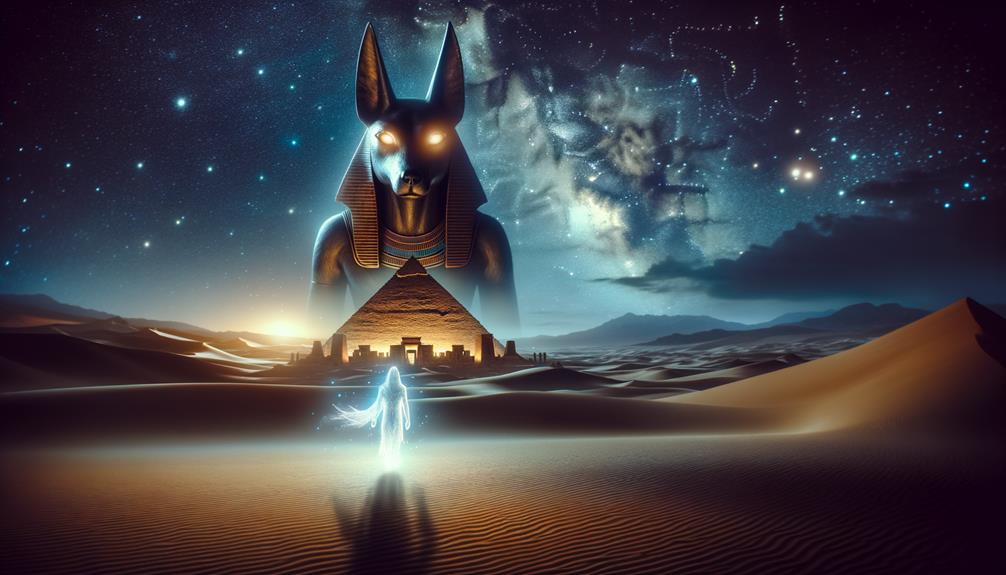
Expanding on our insights about Anubis symbolism, we'll now delve into his key role as a guide on the hazardous journey in the Land of the Dead. In the book series 'Secrets of the Ancient Gods', Anubis, the guide of the afterlife, is presented to young readers in a fresh and imaginative way. The series digs into the often misunderstood concept of the afterlife journey, explaining the roles and duties of the Ancient Egyptian gods.
The narrative of Anubis and the afterlife journey, according to Egyptian beliefs and rituals—including mummification, is vividly depicted. Anubis' essential role in afterlife rituals can be summed up as:
- Guiding through the feared Land, inhabited by gods, monsters, and pharaohs.
- Supervising the heart's weighing, a significant test in the afterlife.
- Leading the deceased through the final judgment, assuring their safe transition.
The 'Secrets of the Ancient' series familiarizes readers with ancient practices and beliefs, offering a thorough understanding of the mythical and historical intricacies of the Ancient Egyptians. This study of Anubis, the guide through the feared Land, provides an engaging and enlightening journey into the enigmatic world of the afterlife.
Modern Perspectives on Anubis
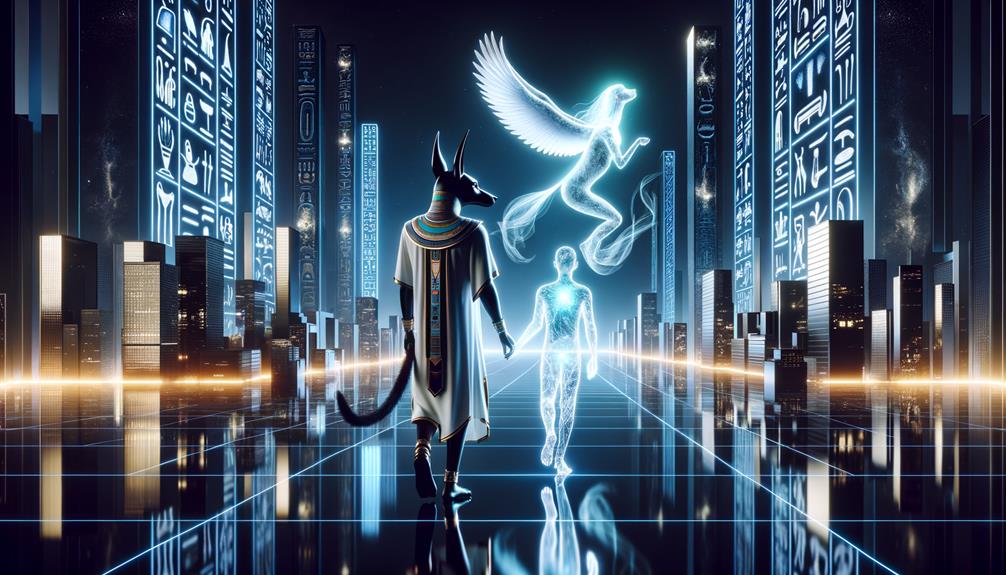
Focusing on the present, Anubis still holds a certain allure for contemporary audiences, notably through the writings of Vicky Alvear Shecter. Her publication 'Anubis Speaks! A Guide to the Afterlife by the Egyptian God of the Dead' portrays Anubis as a guide, steering readers through the Land of the Dead. It's a thrilling journey from encountering formidable gods and grotesque beasts, to revealing the mysteries of mummification. Shecter masterfully brings the ancient era back to life with her unique style.
Inspired by her personal interest in Anubis and the afterlife, Shecter skillfully recounts the conflict of the gods against Apophis, the personification of chaos in ancient Egyptian legend. This contemporary view on Anubis simplifies the complex aspects of ancient Egyptian traditions and rituals, making them comprehensible for today's readers. The book's informative yet lively approach, mixed with its casual storytelling style, is attractive to followers of Anubis, those intrigued by the macabre, and readers interested in ancient Egypt and mythology.
Frequently Asked Questions
How Did Anubis Guide the Dead?
So, you're curious about how Anubis, the ancient Egyptian god, guided the dead? Well, it's a fascinating process. Anubis had a major role to play, leading the spirits of the departed through the Land of the Dead. Picture him as a spiritual guide, ensuring the safety of the innocent souls along their journey.
But that's not all. Anubis wasn't just a guide; he was also part of the judgement panel for the souls. He played a key role in deciding the fate of the afterlife for these spirits. Now, imagine being in that position – it's a pretty big deal, right?
And let's not forget about mummification. This was a significant practice in ancient Egypt, and guess who was a crucial part of it? That's right, Anubis. He oversaw this process, making sure everything went as planned. It's quite a big job, but Anubis was up for the task.
What Was Anubis Role in the Afterlife?
So, you're curious about Anubis and his part in the afterlife, huh? Well, he had quite a few jobs to handle. Firstly, he would guide and safeguard spirits on their journey. Then, he was in charge of the heart-weighing business, ensuring everything was fair and square. And let's not forget his help with mummification. All in all, his tasks were crucial for ensuring a smooth transition for souls entering the afterlife.
What Does Anubis Rule?
So, you're curious about Anubis, huh? Well, let's delve into this together. From what we know, Anubis had a pretty important job in the beliefs of ancient Egypt. People saw him as the big boss of the Land of the Dead. Not only that, but he also had the role of mummy protector and was in charge of embalming. Pretty cool, right? But wait, there's more. Anubis also had the task of judging souls in a place called the Halls of Maati. So, in a nutshell, Anubis was a big deal in ancient Egypt!
Who Was the Egyptian God Guide to the Afterlife?
So, you're curious about the ancient Egyptian god who was considered the guide to the afterlife? Well, let me introduce you to Anubis. With a head resembling a jackal, Anubis was seen as the shepherd of souls in the afterlife in the complex world of Egyptian mythology. His key role was to guide, evaluate, and safeguard these souls, making sure they reached their destination in the mysterious world beyond our own.

